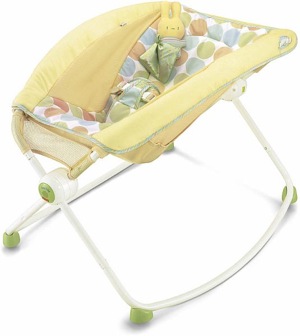Top Class Actions’s website and social media posts use affiliate links. If you make a purchase using such links, we may receive a commission, but it will not result in any additional charges to you. Please review our Affiliate Link Disclosure for more information.

Mattel manufactured the Fisher Price Rock ‘n’ Play Sleeper, and sold over 800,000 sleepers between October 2009 and January 2013. Lead plaintiff Brandon Butler had purchased the Rock ‘n’ Play and claimed the sleeper grew mold due to poor ventilation. Butler claimed in the proposed class action lawsuit that studies suggest that infants who are exposed to environmental mold are three times more likely to develop asthma later in childhood.
The Rock ‘n’ Play class action lawsuit further claimed that Mattel failed to test the Sleeper appropriately for mold even though the sleeper would routinely be exposed to moisture, and alleged that Mattel only tested the product after hundreds of consumers complained.
In December 2013, Butler filed a motion to certify a Class that included other purchasers of the Fisher Price Rock-n-Play Sleeper because, Butler alleges, the sleeper is defective and has a “dangerous propensity” to grow mold. Some parents have complained their babies were hospitalized for respiratory problems after being exposed to the baby seat mold.
In a ruling issued Feb. 24, Judge Dale S. Fisher denied the motion to certify the class action lawsuit because Butler “fail[ed] to establish that any actual defect was common to the entire class.” The judge pointed out that “[t]here is ample evidence in the record that the vast majority of the proposed class did not experience mold growth in the Sleeper to a degree that they saw fit to complain the [Mattel] or to the Consumer Product Safety Commission.”
Butler had submitted expert testimony, however the judge found this unpersuasive. “[The expert] only reviewed the Sleeper’s design, determined that it could retain water under some conditions, and from that concluded that the Sleeper could grow mold” the judge said, ” [t]his is not particularly helpful to determining if class members would likely experience mold growth on the Sleeper under normal use.”
In refusing to certify the Class proposed by Butler, the judge stated “[w]hile it appears that the Sleeper may develop mold under certain circumstances, there is no evidence that those circumstances were common across the class or even frequently experienced among the Class.”
“Plaintiffs have not provided the Court with any independent attempt to demonstrate that the Sleeper grows mold with normal use” the judge said, “[t]here is no evidence that every Sleeper developed notable levels of mold and ample evidence that most of them did not.”
The judge indicated that a Rock ‘n’ Play class action lawsuit may exist. “Of course, some members of the Class were affected by mold on the Sleeper,” however that judge also said “it is not clear that whether any child suffered a reaction or injury.”
The judge further noted in response to complaints, Mattel had issues a limited “recall” where Mattel provided additional care instructions for cleaning any mold that occurred on the Sleeper.
In sum, the judge rejected Butlers motion to certify a Class, “[e]ven if the Sleeper may be likely to grow mold under certain circumstances, this would provide standing to consumers who have not or will not subject the Sleeper to those conditions.”
Butler’s lawyer indicated the ruling was unexpected.
The lead plaintiff, Brandon Butler, is represented by Sarah G. Conway, Hugh R. Whiting, Peter J. Biersteker, and Erik K. Swanholt of Jones Day.
The Fisher Price Moldy Baby Seat Class Action Lawsuit is Butler v. Mattel Inc., et al., Case No. 2:13-cv-00306, in the U.S. District Court for the Central District of California.
UPDATE: On Apr. 5, 2016, an Alabama federal judge denied class certification for two nationwide classes of consumers in a lawsuit against Fisher-Price over its alleged moldy baby sleeper, stating that the classes were not adequately defined and that some of the claims were not certifiable.
ATTORNEY ADVERTISING
Top Class Actions is a Proud Member of the American Bar Association
LEGAL INFORMATION IS NOT LEGAL ADVICE
Top Class Actions Legal Statement
©2008 – 2024 Top Class Actions® LLC
Various Trademarks held by their respective owners
This website is not intended for viewing or usage by European Union citizens.















One thought on Fisher Price Moldy Baby Seat Class Action Lawsuit Denied Certification
UPDATE: On Apr. 5, 2016, an Alabama federal judge denied class certification for two nationwide classes of consumers in a lawsuit against Fisher-Price over its alleged moldy baby sleeper, stating that the classes were not adequately defined and that some of the claims were not certifiable.